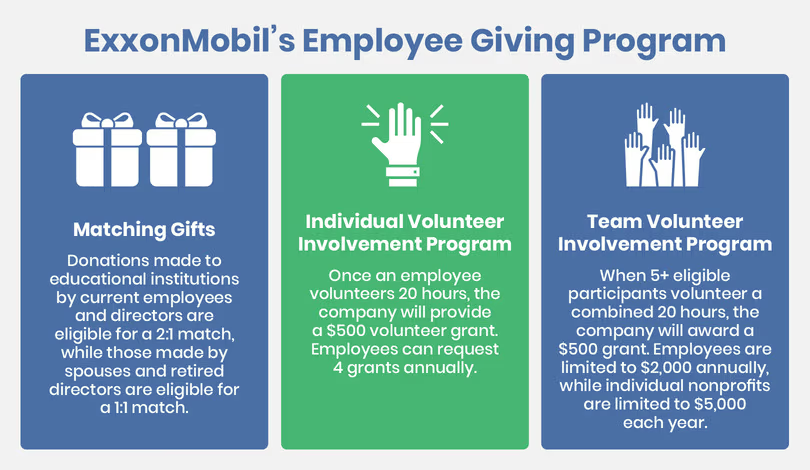Why modern companies use corporate philanthropy to boost brand loyalty and customer trust
Discovering How Corporate Philanthropy Shapes Brand Reputation and Client Loyalty
Corporate philanthropy significantly affects brand credibility and customer commitment. Firms that engage in authentic philanthropic efforts typically see a favorable shift in how customers view them. This positioning of worths promotes trust fund and emotional links with target markets. However, the performance of these philanthropic efforts can differ significantly. Recognizing what truly resonates with customers is essential for brand names seeking to enhance their social effect and market placement. What strategies will arise as crucial for future success?
The Advancement of Company Philanthropy
As services increasingly recognize their duty in society, the evolution of company philanthropy has actually changed from simple philanthropic donations to a critical element of brand name identity. Firms involved in philanthropy mainly for tax obligation benefits or to boost their public photo. Gradually, this method changed as stakeholders-- consisting of capitalists, workers, and customers-- required a more authentic commitment to social obligation.
Organizations started aligning their humanitarian initiatives with their core worths and company purposes, causing even more impactful and thoughtful payments. This adjustment has actually encouraged firms to purchase sustainable techniques and area development, fostering a sense of function that resonates with consumers.
Technical innovations have helped with transparency and interaction, enabling services to display their philanthropic initiatives a lot more successfully. Corporate philanthropy has actually arised as an indispensable part of company approach, with organizations welcoming the possibility to favorably affect culture while enhancing their general brand name story.
The Impact of Philanthropy on Brand Assumption
While business take part in philanthropic efforts to promote social excellent, these campaigns considerably shape brand understanding amongst customers. Business philanthropy can boost a brand name's photo by associating it with favorable social impact and area involvement. Consumers frequently view brand names that proactively take part in charitable activities as even more trustworthy and responsible. This understanding can influence purchasing choices, as customers may choose brands that show a dedication to social issues.

Structure Emotional Connections Via Giving
Company philanthropy serves as an effective device for boosting brand name identification by connecting company values with community needs. Via tactical providing, firms can promote community interaction and develop shared values that resonate with customers on an emotional level. This approach not just enhances brand name credibility yet additionally constructs lasting links between companies and their stakeholders.
Enhancing Brand Name Identity
They not just add to societal great yet likewise create much deeper psychological connections with their audiences when firms involve in philanthropic initiatives. By straightening their brand name with charitable reasons, firms boost their identification and signal values that reverberate with consumers. This placement develops a story that goes past services and products, welcoming customers to join a common objective. As customers increasingly focus on purpose-driven brand names, companies that actively participate in giving can separate themselves in a jampacked market. Such efforts promote a sense of commitment amongst customers who feel personally attached to the brand's worths. Eventually, business philanthropy becomes an essential device for enhancing brand identity, growing lasting partnerships based on shared ideas and psychological interaction.
Fostering Area Involvement
Countless studies indicate that firms taking part in community-focused kind campaigns can noticeably strengthen psychological links with their stakeholders. By spending in neighborhood jobs and supporting social causes, businesses cultivate a feeling of belonging and trust fund within the area. This interaction promotes a positive brand name picture, as consumers appreciate business that show genuine concern for social issues. Additionally, workers frequently really feel extra motivated and proud to be connected with a company that prioritizes neighborhood welfare. Therefore, customers are much more likely to establish commitment towards brands that proactively add to meaningful causes. Inevitably, cultivating area involvement via philanthropy not only boosts brand name track record however also constructs long lasting emotional connections that benefit both the area and the firm it serves.
Producing Shared Values
Just how can services efficiently develop common worths that reverberate with their stakeholders? Firms can accomplish this by aligning their humanitarian initiatives with their core goal and the interests of their communities. By participating in initiatives that deal with neighborhood demands, services promote emotional links with consumers, boosting brand name commitment. For instance, partnering with non-profits that mirror shared values enhances the brand name's picture and demonstrates dedication to social duty. Additionally, transparent communication regarding these initiatives permits stakeholders to see the concrete influence of their contributions. Eventually, by integrating common values right into their business philanthropy, companies not just enhance their track records but additionally grow long lasting connections with clients, causing raised loyalty and trust fund. This alignment is crucial in contemporary customer decision-making.
Case Studies: Successful Philanthropic Campaigns
Taking a look at successful philanthropic campaigns reveals various approaches that enhance brand name credibility. Impactful neighborhood campaigns, cutting-edge partnership versions, and long-term involvement approaches have actually proven effective in promoting favorable connections with consumers. These situation studies highlight the value of thoughtful business providing in achieving both social and business purposes.
Impactful Area Initiatives
Many companies have effectively leveraged kind projects to enhance their brand name track record while making a purposeful impact in their communities. An innovation firm launched a digital proficiency program in underserved neighborhoods, providing training and resources that equipped regional residents. This initiative not only added to area development but likewise positioned the company as a socially responsible leader. A major food company implemented an appetite relief campaign, partnering with neighborhood nonprofits to distribute dishes to families in need. This effort enhanced community ties and cultivated client loyalty. Via these impactful campaigns, business have shown their commitment to social duty, efficiently straightening their brand worths with the demands of the communities they offer, inevitably improving their general reputation.
Ingenious Collaboration Models
The success of impactful area campaigns frequently depends upon ingenious collaboration designs that combine varied stakeholders to resolve complicated social challenges. Instance studies highlight just how firms, non-profits, and government entities can team up properly. For example, an international firm partnered with a local non-profit to introduce an education and learning program, pooling resources and experience to enhance community proficiency prices. Another instance included a tech firm and a healthcare company joining pressures to create a telemedicine remedy for underserved populations. These collaborations not only enhanced the reach of philanthropic initiatives but additionally strengthened the brand names' track records by aligning their goals with community demands. Ultimately, innovative collaboration designs function as a catalyst for meaningful change and foster more powerful connections between brands and their customers.
Lasting Interaction Techniques

Measuring the ROI of Company Social Obligation
As firms progressively invest in corporate social responsibility (CSR) efforts, recognizing the return on investment (ROI) related to these initiatives ends up being important. Determining ROI in CSR is complex, usually including both quantitative and qualitative metrics. Financial returns can be analyzed through enhanced sales, boosted brand loyalty, and enhanced employee spirits, which can lead to greater performance. Furthermore, business may evaluate cost savings connected to lasting techniques, such as minimized waste or energy usage.
Qualitatively, the effect of CSR on brand name track record can be evaluated through consumer assumption studies and social networks view evaluation. Studies can give insights right into exactly how CSR activities influence customer commitment and trust. Benchmarking against industry standards can assist organizations evaluate their CSR efficiency - corporate philanthropy. Ultimately, a complete technique to measuring ROI enables firms to make enlightened decisions regarding future CSR investments, straightening techniques with both economic efficiency and social influence
Customer Assumptions and Business Obligation
Progressively, consumers expect companies to operate with a solid sense of company responsibility, seeing moral practices as a requirement for brand name loyalty. This shift in expectation reflects a growing recognition of social and environmental issues, leading clients to favor brands that straighten with their values. Consumers are more inclined to sustain business that participate in transparent techniques, demonstrate sustainability, and add favorably to their areas.
In addition, social networks enhances these assumptions, allowing consumers to share their experiences and opinions promptly. Brand names that fail to meet these moral requirements run the risk of backlash, while those that embrace corporate duty usually enjoy superior online reputation and consumer loyalty. As consumers demand liability, firms should incorporate business social obligation into their core techniques, prioritizing moral actions not equally as a marketing strategy, but as an essential element of their procedures. This positioning can eventually cause stronger brand affinity and sustained success in open markets.
Future Patterns in Corporate Philanthropy and Brand Loyalty
The landscape of company philanthropy is evolving, affected by the increased consumer assumptions bordering corporate duty. Business are increasingly integrating social effect right into their core business approaches, not just as a secondary task. Future trends show a change toward openness, with brand names sharing in-depth information regarding their philanthropic efforts and their direct results on neighborhoods.
In addition, innovation is playing an essential role, enabling real-time involvement in between brand names and customers. Social media systems help with straight interaction, enabling consumers to voice their assumptions and hold brands accountable. Furthermore, more youthful generations, particularly Millennials and Gen Z, prioritize sustainability and moral techniques, driving organizations to take on even more conscientious methods.
As business philanthropy comes to be synonymous with brand name identity, companies that authentically align their missions with social demands are likely to foster more powerful customer loyalty. This merging of values will inevitably shape the future of business online reputation and customer partnerships in a progressively conscientious industry.
Often Asked Inquiries
Exactly How Do Customers Locate Out About a Business's Philanthropic Initiatives?
Consumers uncover a firm's philanthropic initiatives through different networks, including social media, news release, neighborhood events, and word-of-mouth. These avenues facilitate understanding, enabling people to engage with brands that align with view publisher site their interests and values.
What Duty Does Employee Involvement Play in Company Philanthropy?
Employee participation in corporate philanthropy improves interaction, promotes a sense of possession, and reinforces group cohesion - corporate philanthropy. This involvement usually magnifies the impact of philanthropic campaigns, leading to greater recognition and assistance for the firm's humanitarian efforts
Can Corporate Philanthropy Backfire on a Brand name's Reputation?
If regarded as insincere or opportunistic, company philanthropy can indeed backfire on a brand's credibility. Adverse public assumption may arise, bring about lessened depend on and commitment among consumers that focus on authenticity in company actions.
Are Smaller Firms as Efficient in Philanthropy as Larger Companies?
Smaller sized business can be equally efficient in philanthropy as larger corporations, usually demonstrating agility and credibility. Their localized initiatives may resonate a lot go to this web-site more deeply with areas, fostering real links regardless of minimal sources contrasted to their bigger counterparts.
Exactly How Can Companies Select the Right Causes to Assistance?
Companies can select the right trigger by straightening their values with community demands, examining stakeholder passions, and reviewing potential impact. This strategic method promotes authenticity, boosts involvement, and reinforces links with customers and the broader neighborhood.
While companies involve in kind initiatives to advertise social good, these initiatives substantially form brand assumption amongst consumers. As consumers increasingly prioritize purpose-driven brands, companies that proactively involve in offering can separate themselves in a jampacked market. Many business have efficiently leveraged philanthropic campaigns to boost their brand name track record while making a purposeful influence in their neighborhoods. Progressively, consumers expect companies to operate with a strong sense of business responsibility, checking out moral methods as a prerequisite for brand name loyalty. As company philanthropy becomes associated with brand name identification, companies that authentically straighten their goals with societal demands are likely to foster more powerful customer commitment.